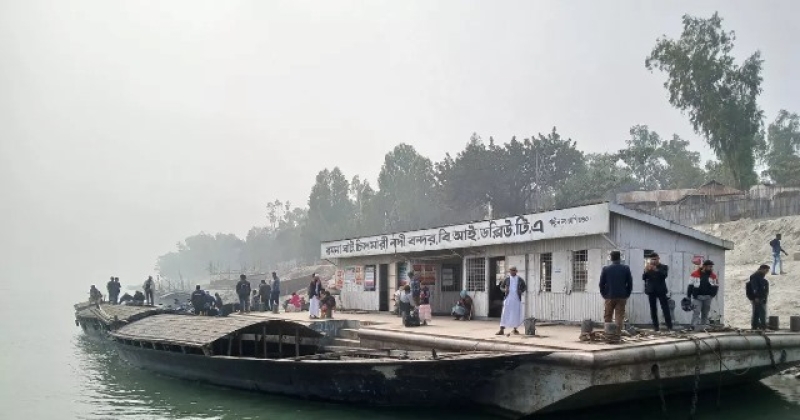- Power generation at Payra Thermal Power Plant 1st unit starts after a month |
- Irregularities, injustice will no longer be accepted in politics: Jamaat Ameer |
- 2 arrested in Jhenaidah for allegedly selling madrasa student |
- Koko’s wife campaigns for Tarique in Dhaka-17 |
- Bangladeshi Expats Cast 4.58 Lakh Postal Votes |
Brahmaputra ferry crisis deepens for poor navigability in Kurigram

Brahmaputra Ferry pontoon at Chilmari River Port. Photo UNB_11zon
Kurigram, Feb 6 – The persistent navigability crisis on the Brahmaputra River along the Chilmari-Roumari waterway remains unaddressed, despite repeated promises of year-round dredging.
While the Bangladesh Inland Water Transport Authority (BIWTA) continues to fall short in ensuring a navigable route, the government is bearing heavy financial losses due to ineffective dredging operations, locals alleged.
Unfulfilled Promises and Rising Frustration
In September last year, then-chairman of the Bangladesh Inland Water Transport Corporation (BIWTC), Dr AKM Matiur Rahman, stressed the urgent need for dredging. But BIWTA has yet to take substantial action, locals claim.
Residents and transport operators have expressed growing frustration, accusing BIWTA of negligence.
Many believe that vested syndicates of boat owners and transport operators are profiting from the crisis, as passengers are forced to rely on costly boat rides in the absence of ferries.
The 22-kilometre Chilmari-Roumari route, crucial for regional trade and daily commutes, has been plagued by interruptions since ferry services were launched on September 20, 2023.
Recurring suspensions due to poor navigability have left passengers and businesses in distress.
Economic Toll and Infrastructure Shortcomings
Reports indicate that the BIWTC incurs losses of approximately Tk 12.3 lakh per month due to the ferry service suspension. The inactivity is also causing mechanical wear and tear on ferry engines, compounding the problem.
According to sources, the crisis is worsened by the absence of high-water and low-water docks, a lack of permanent dredging equipment, and the failure to install navigation lights for nighttime operations.
Passengers are struggling with exorbitant boat fares. “The ferry was a blessing. Now, I have to pay Tk 60 to board my motorcycle, another Tk 60 to disembark, and Tk 100 as fare. For individual passengers, it’s Tk 100 per head—far too expensive for many of us,” said Alom Mia, a local commuter.
Transport operators argue that simple infrastructural adjustments could significantly improve ferry services. “If the Chilmari ferry terminal were moved slightly to Fakirerhat, the travel distance would be reduced. Additionally, introducing night navigation would allow 24-hour operations, easing transportation challenges,” said Mozammel Hossain, a Rangpur bus driver.
Truck drivers from Sonahat land port in Bhurungamari recalled that navigation lights were installed before last year’s floods but were later removed and never reinstalled.
“After 3:30 pm, no ferries load vehicles. If a truck arrives late, it has to wait overnight. With proper navigation lights, more night-time crossings would be possible,” said truck driver Hasan Ali.
Authorities Struggle for Solutions
BIWTC’s Chilmari Commercial Manager, Prafulla Chauhan, acknowledged that ferry services have remained suspended since December 23, causing severe inconvenience to passengers and businesses.
“Restoring ferry operations as soon as possible is essential to resolving the ongoing crisis,” he stated.
BIWTA Assistant Engineer Md Kamruzzaman admitted that dredging efforts have been largely ineffective.
“Three out of five dredgers are in operation, but the riverbed refills within hours, making it difficult to maintain navigability. At this stage, we cannot provide a specific timeline for resuming ferry services,” he said.
Meanwhile, BIWTA Deputy Director Rabiul Islam assured that night navigation lights would be installed once ferry operations resume.
A Call for Long-Term Solutions
Experts and locals agree that a sustainable resolution requires consistent dredging, the construction of low-water docks, well-maintained approach roads, and permanent navigation lights. Until then, ferry services on this crucial route will remain unreliable, continuing to disrupt lives and livelihoods. - UNB

